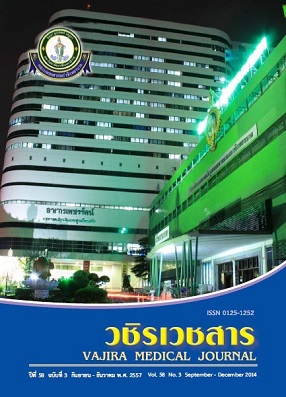Induction therapy in kidney transplantation
Main Article Content
Abstract
Induction therapy in kidney transplantation is one of the strategies in order to prevent acute allograft rejection which contributed to better graft and patient survival. In the present, induction therapy is parted of the standard kidney transplant protocol with increasing uses. Induction agents used mainly in clinical practice nowadays are rabbit antithymocyte globulin (rabbit ATG) and basiliximab. Rabbit ATG had the potent efficacy for acute allograft prevention in all circumstances but hampered with serious adverse effects especially infection and malignancy. In contrast, basiliximab was inferior to rabbit ATG in efficacy but provided satisfactory safety profiles. There is no definitive consensus on selection of induction agents in induction therapy but generally focused on the basis of risk–benefit considerations for each patient.


